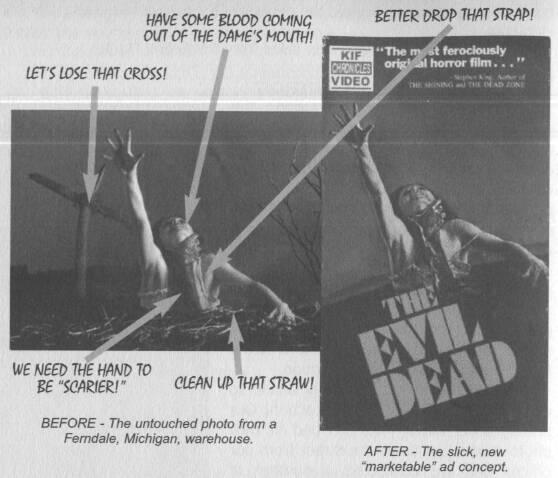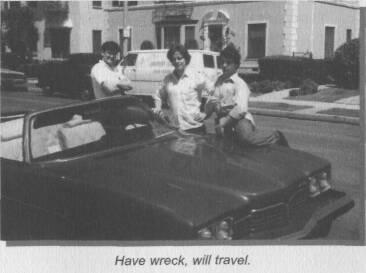If Chins Could Kill: Confessions of a B Movie Actor (26 page)
Read If Chins Could Kill: Confessions of a B Movie Actor Online
Authors: Bruce Campbell
Tags: #Autobiography, #United States, #General, #Biography & Autobiography, #Biography, #Entertainment & Performing Arts - General, #Entertainment & Performing Arts, #Actors, #Performing Arts, #Entertainment & Performing Arts - Actors & Actresses, #1958-, #History & Criticism, #Film & Video, #Bruce, #Motion picture actors and actr, #Film & Video - History & Criticism, #Campbell, #Motion picture actors and actresses - United States, #Film & Video - General, #Motion picture actors and actresses

During production, we had taken some pictures, but they were mostly behind-the-scenes stuff, or "Hey Sam, make a funny face!" -- nothing useful for promotion.
Irvin suggested that we simply fake it, so early in 1982, we got back in action. Our photographer buddy Mike Ditz had his own photo studio just down the street from our offices and we concocted a number of poses. Armed with a shotgun, shovel and monster arms, we worked all night creating our first marketing concepts.
It was the first time we had to think about how an audience should view this film. Should we be explicit? Should we imply the evil? Because we had no idea what would sell, our photographs represented numerous themes: "Man vs. Demons," "Man and Woman vs. Demons," and even "Woman Overcome by Demons."
Next on Irvin's list was a trailer, or coming attraction -- those slick highlights you see in a theater before the main feature. Sam pieced ours together in one of the cramped dentist cubicles with a Moviola editing machine that shredded more film than it put together.
The process of laying out the first advertisement was more technical than anything -- it was all about the dimensions of the paper you were advertising in and how many screen lines it had and how to make an original photo into a Velox or half-tone or transparency.
The idea of photo retouching was a curious peek into the world of advertising. If something in the original picture bothered us, like a visible bolt on the skeleton arm, or a lack of sheen to the chainsaw blade, we simply changed it.
The last items for our promotional shopping cart were easier to come by -- let's face it, every city has a custom T-shirt shop. Our
Evil Dead
shirts were made at the same place that would have cranked out Biff's Bump Shop, or Big Al's Car Stereo Warehouse, so no big challenge there.
Blank match books, we found, had to be purchased from a wholesaler before a printing company could adorn their covers, and that buttons could be hand-made, as long as you bought a few basic tools. This all seemed like a lot of work at the time, but it wasn't until years later that we realized how good we had it. As filmmakers for a studio, you quickly become the fifth wheel once you hand over a completed print.
On
Evil Dead,
we had our fingers in every pie and remained connected to the film until the bitter end -- for what was to be the first and last time.
Armed with 500 matchbooks, 150 T-shirts, 48 hats, 200 buttons, 1,200 brochures, and 500 invitations, Irvin could now do his magic.
First stop: the American Film Market.
JUST ANOTHER WIDGET
In case it's all a mystery, buying and selling films isn't all that different from buying and selling clothes hangers -- you've got a product to sell and you want to find buyers. Manufactured products are exhibited at trade shows all around the country -- you've heard the ads: "Don't miss the Home and Garden Expo, this weekend only at the downtown convention center."
Films are sold the same way. Three times a year, in Los Angeles, Cannes France, and Milan Italy, films from around the world are bought and sold like slabs of meat -- country by country.
In fact, the American "Meat" Market would be a more appropriate name. Chronologically, it is the first one of the year, usually in March, and it works like this: the market organizers take over several major hotels while the sellers, the foreign sales agents, each take a suite in which to hawk their wares. Buyers from around the world wander in and out of the suites, each with a budget and a laundry list of the type of films they are willing to buy.
Let's say Joe Germany walks into Acme Foreign Sales Company and he's looking for a horror picture to round out his purchases. By this point, he may have already seen ads in trade magazines like
Variety
or
Screen International
and knows that Acme represents several horror titles.
Acme would show Joe their racks of 8½" x 11" ad slicks (which look like mini movie posters) for the flicks available, and if one interests him, he'll ask for more information. It's an incremental thing -- the sellers want to lure the buyer deep into their lair, where the arm-twisting can begin.
Joe the buyer might then wish to see a trailer (like the one Sam edited). If this keeps his interest, he'll arrange to see the entire film at a local cineplex that has been taken over by the film market. If Joe likes what he sees, he'll come back to Acme and they'll begin negotiations.
Having that useless information as a backdrop, enter the three Midwesterners.
23
LA-LA-LAND
March 24, 1982, Rob, Sam and I arrived in Hollywood.
Stepping off the plane, we got the first of many surprises -- the weather was lousy. This was supposed to be the land of eternal sunshine, but during the first two weeks of our stay, it drizzled almost every day.
When the sun did come out, it was a lovely dry heat and the air would be clear, but not for long. Within twenty-four hours of any rain, an orange-yellow haze would build up until you couldn't see the mountains anymore.
Picking up our "Rent-A-Wreck" '65 Cadillac convertible, we took on the LA freeways and they certainly lived up to their reputation -- some sections were eight lanes in
each
direction and made the freeways back in Detroit seem cute in comparison.
Still, with no public transportation to speak of, Los Angeles was a car town and traffic jams occurred at any hour of the day or night -- a flat tire or an overheated radiator could start a chain reaction that stretched for miles. Few things were more disturbing than being stuck in a major traffic jam at one o'clock in the morning.
To my taste buds, cuisine in southern California was very exotic. In Detroit, Chinese and Italian were about the only "ethnic" foods available, so it was an eye-opener to sample Japanese, Korean, Thai, or even Mexican food.
I wasn't aware how lame the fruits and vegetables were back East until I set foot in a California supermarket. Suddenly, I had three choices of lettuce other than iceberg, and I could get strawberries the size of golf balls -- but what surprised me most was the orange juice. In Michigan, I never liked the stuff -- it was always bitter and awful, but I was led to believe that this was normal. In California, I could get fresh-squeezed orange juice at almost every restaurant, and it was sweet, pulpy, and wonderful.
Sociologically speaking, LA was a crazy place -- the mix of ethnicity was as startling as it was amazing. I had never seen anyone who was "Eurasian," or a mix of black and Latino. It also puzzled me that attendants at 7-Eleven, or even McDonald's of all places, had trouble with the English language.
When we wandered into trendier areas, beautiful people seemed to be everywhere. A native from LA explained that it resulted from generations of pretty people who had come to Hollywood to find fame and fortune mating with other pretty people who had come to Hollywood to find fame and fortune. What really struck me was the amount of attention that people gave to the human body. Working out was the religion of choice, and if that didn't result in the perfect body, they liposucked, body-sculpted, and breast-augmented themselves the rest of the way.
As twisted as it was, it made sense -- this was Hollywood, the wannabe capital of the world, so why wouldn't every
Miss Boot Lick Arkansas
in the country gravitate there? The thing that saddened me was that the actors I met seemed far more concerned with outward appearance than with training or, dare I say, talent.
When we weren't attending screenings of the film, or meeting with buyers, we were at the beach, body surfing. I remember the sensation of diving into the Pacific Ocean for the first time -- as I surfaced, I spit out a mouthful of water.
"Yuck, this is
salty..."
As a person accustomed to fresh water, I found this an apt metaphor for Hollywood: It looks inviting on the outside, but if you dive in, you're in for a shock.
CAN I CALL YOU CHUCK?
The real stunner of that first LA experience, though, was the city of Hollywood itself. Nothing like the postcards I'd seen, Hollywood is a seedy place where the rich and famous are scarce and you're more likely to see hourly motels, hookers and burned-out rock 'n rollers. This Hollywood didn't represent the best and the brightest -- it was a place where Hugh Grant could get a blowjob.
Having said that, I'm happy to say that I met my first movie star there. Rob, Sam and I strolled along the
Walk of Fame,
past the stars of Jack Benny, Dinah Shore, Charlton Heston... wait, that's no star... that's really
him!
I ran after him, repeatedly calling out "Mr. Heston, Mr. Heston" until he had to look back, no doubt trying to gauge my particular level of mania.
"... Yes?"
Taking advantage of this hesitation, I swung around in front of him and thrust out my hand. He was gracious and patient as I babbled incoherently about this film or that. After sufficient groveling, I let him pass.
Charlton Heston would continue to crop up in my life.
Irvin's company got us special passes so we could roam the American Film Market, gawking at the immense amount of independent films for sale. In the evenings, the market organizers lined up a number of splashy "show biz" events to wow the prospective buyers. Being an actor in
Evil Dead,
I was put on the invite list to a swank bash at Universal Studios.




